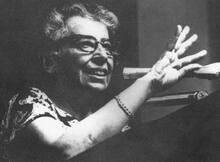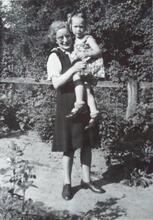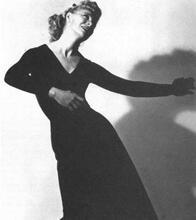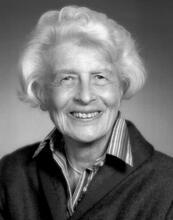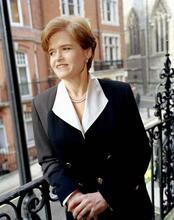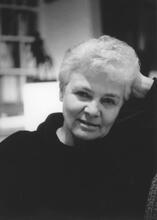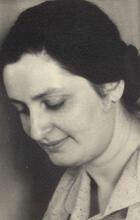Lilli Henoch
Born into an upper-middle-class family, Lilli Henoch quickly developed a love for sports. After joining the Berlin Sports Club (BSC), she was a key player on its handball, hockey, and track teams and held leadership positions in the Club. She achieved many feats, notably a world record in the 4x100 meter relay race in 1926. Pushed out of the BSC in 1933 after the Nazi rise to power, Henoch kept competing in Jewish leagues and became a gymnastics teacher. She worked until 1942, when she was deported and murdered.
Early Life
Lilli Henoch was born in 1899 to an upper middle-class family. Despite her merchant father’s death, a relocation to Berlin, and the remarriage of her mother, the family was able to maintain its previous high standard of living. Even in childhood Lilli Henoch had developed a passion for sport, particularly track and field and team sports. This was comparatively rare for a woman in the 1920s, when track and field sports were considered unwomanly.
Athletic Career
In consequence, women’s track and field athletics were accepted into the Olympics only in 1928, after considerable dispute, although the German Sports Authority for Athletics had in 1919 already called for the establishment of a women’s section. Similarly, the Berlin Sports Club (BSC), founded in 1895, in 1919 established a women’s track and field section, which rapidly grew to comprise one hundred and twenty members. The latter engaged not only in track and field sports, but also in handball, which was developed as a women’s game after the end of World War I.
Lilli Henoch, who joined the BSC shortly after the war, soon became its best athlete and was admired not only because of the level of her performance but also due to her amazing versatility. In the 1920s she was the mainstay and captain of the BSC’s women’s handball team. In addition, she was a member of the club’s hockey team, which won the Berlin championship in 1925. In shot put and discus, she was not only the best performer in Germany, but among the best in the world, several times achieving official and unofficial records in these sports. In 1924 she also became the German long-jump champion and in 1926 she and her teammates achieved a world record in the 4x100 meter relay race.
Lilli Henoch was fully integrated into the club. Not only was she a model sportswoman, but she was also appointed to several honorary positions. Her contributions and activities were enormously appreciated. The club’s publication continually reported on her doings. Thus, for example, the author of an article published on the occasion of the tenth anniversary of the women’s section praised the “exemplary loyalty” of the women competitors: “Above all, Lilly Henoch, who has won no less than seven German championship titles and three German relay races. Especially Lilly Henoch! If ever you need an example of club loyalty and selflessness, call her name. And the air around us will become clean” (Ehlert, 1989, 40). The high esteem in which she was held in the association is evidenced by the fact that even on January 18, 1933, just fourteen days before Hitler was named chancellor, Lilli Henoch was elected chairwoman of the women’s athletic section.
Henoch’s career in sport and the public recognition of her achievements are particularly remarkable given that track and field sports were still considered a male domain and the women athletes were easily suspected of “masculinization.”
We know little about Henoch’s attitude to Judaism, but that she did not totally break off connections with it is evidenced by the fact that in 1924 she was engaged to train the women’s section of Bar Kokhba Berlin.
Life in Nazi Germany
In the process of the 1933 “Aryanization,” which the sports organizations sought to implement with swift obedience, Lilli Henoch—though still highly esteemed—was, like all Jews, compelled to leave the club and seek a new haven for her sport activities. She chose the Jüdischen Turn-und Sportclub 1905 (JTSC), which amalgamated with the national-German oriented Schild Sportbund des Reichsbundes jüdischer Frontsoldaten. Here Lilli Henoch continued to be active in track and field sports but especially as a handball player. Her team won the Berlin Championship of Jewish Handball Players in both 1935 and 1936.
From 1933 on, Lilli Henoch was also the beloved gymnastics teacher at the Jewish elementary school in the Rykestrasse. It is, however, impossible to determine how long she continued working at the school, where teaching continued under increasingly chaotic circumstances until 1942. In any case, the conditions in which she lived deteriorated extremely from the mid-1930s, in part because of her stepfather’s death and the additional worries of earning a living in ever more difficult conditions.
On September 5, 1942, Lilli Henoch and her sixty-six-year-old mother were deported to Riga but were shot in the forest shortly before reaching their destination. In a memorial book, her name appears together with many other victims of National Socialism listed as “Missing in Riga.”
Henoch’s career is remarkable in many respects. Her choice of track and field sports, her achievements, and her dedication to her club were exceptional. She could afford this dedication because she was financially secure and independent, which was also atypical. In her memory, Berlin erected a Stolperstein (Holocaust memorial plaque) in 2015, as well as a street in Henoch’s name. The Berlin Sports Club’s women’s sports festival was renamed after Henoch in 2004, bringing her achievements to the attention of modern Germany.
Bahro, Berno. "Lilli Henoch and Martha Jacob – Two Jewish Athletes in Germany Before and After 1933." Sport in History. Volume 30, 2010 - Issue 2: Women and Sport: 267-287.
Ehlert, Martin-Heinz. “Lilli Henoch. Fragmente aus dem Leben einer jüdischen Sportlerin und Turnlehrerin.” In Sozial- und Zeitgeschichte des Sports 3:2 (1989): 34–48.
Ehlert, Martin-Heinz. "Lilli Henoch.” In Vergessene Rekorde. Jüdiche Leichtathletinnen vor und nach 1933, edited by Berno Bahro, Jutta Braun, and Hans –Joachim Teichler, 65-77. Berlin: Vbb Verlag, 2009.


